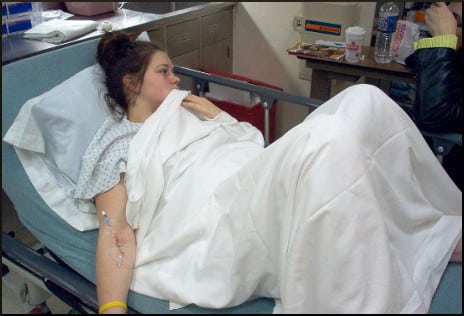
This is the third collection of Childhood Obesity News posts about the same very current and significant topic. The first was “Many Aspects of Bariatric Surgery for Teens” and the second was “Another Teen Surgery Compendium.”
“Let’s Talk About Gastric Banding” describes the AGB, or Adjustable Gastric Band, which has overtaken earlier methods to become the surgery of choice whenever suitable. Part of the reason is that it is the least invasive type, and has the advantage of being reversible, should that become necessary. As in every other post about this method, we mentioned how easy it is for a patient who is not fully committed to overcome the disadvantage of having a very small stomach and stretch it back out into a large stomach.
“Gastric Band Complications and Risks” discusses some of the other problems that can arise with the AGB method. Of course not every patient experiences complications, but enough do to make it a worrying prospect. Some kids need to be operated on again, and the long-term results are not really that impressive.
Gastric bypass surgery has an encouraging long-term success rate, up to a point, but submitting to this procedure brings a lifetime of adjustments and compromises. Patients who are approved for gastric bypass surgery often are required (especially by their insurance companies) to begin exercising, if they haven’t been, and to prepare by losing a certain amount of weight beforehand.
The big question is, if diet and exercise can help these patients lose weight, why are they having surgery in the first place? If they are capable of losing in anticipation of the surgery, why not just go on losing without surgical intervention? Also, we are told that one of the criteria for acceptance is “a history of unsuccessful weight loss attempts by other means.” It seems to add up to quite a Catch-22.
Gastric sleeve surgery, or sleeve gastrectomy, is another irreversible method, and particularly suitable in certain difficult cases. For some reason it has gained a popularity that its adherents might come to regret. In the realm of serious lifestyle change, the duodenal switch procedure is in a whole other class, requiring the most dedicated commitment and a fair amount of money for life-long nutritional supplementation. But it can eliminate or alleviate obesity-related co-morbidities better than any other surgical intervention.
“Bariatric Surgery and the Reversibility Factor” addresses that exact topic, and adds information about the very newest device, a balloon that is meant to stay in place for only six months. Like everything else, it has its drawbacks. If the balloon worked in an ideal way, giving a head start to a person who would then go on to an all-round healthful lifestyle, that would be wonderful. It will be interesting to see how this intervention turns out in the long run.
“The Progress of Weight-Loss Surgery,” as its title suggests, talks about some other new advances in the field. “Paradoxes of Bariatric Surgery” provides a comparative glimpse of how cases are handled in Great Britain, Wales, and the U.S.
“Two Very Obese Little Boys” is pretty self-descriptive, a post about morbidly obese male children, one in China and the other in Saudi Arabia.
All bariatric surgery methods have this in common: the need for both a preparation period, and an afterlife of strict adherence to a whole new set of habits. The W8Loss2Go program is the tool that can help with both, and greatly increase the surgical patient’s chances of ultimate success.
Your responses and feedback are welcome!
Photo credit: Eric Lewis via VisualHunt.com/CC BY-SA

 FAQs and Media Requests:
FAQs and Media Requests: 











